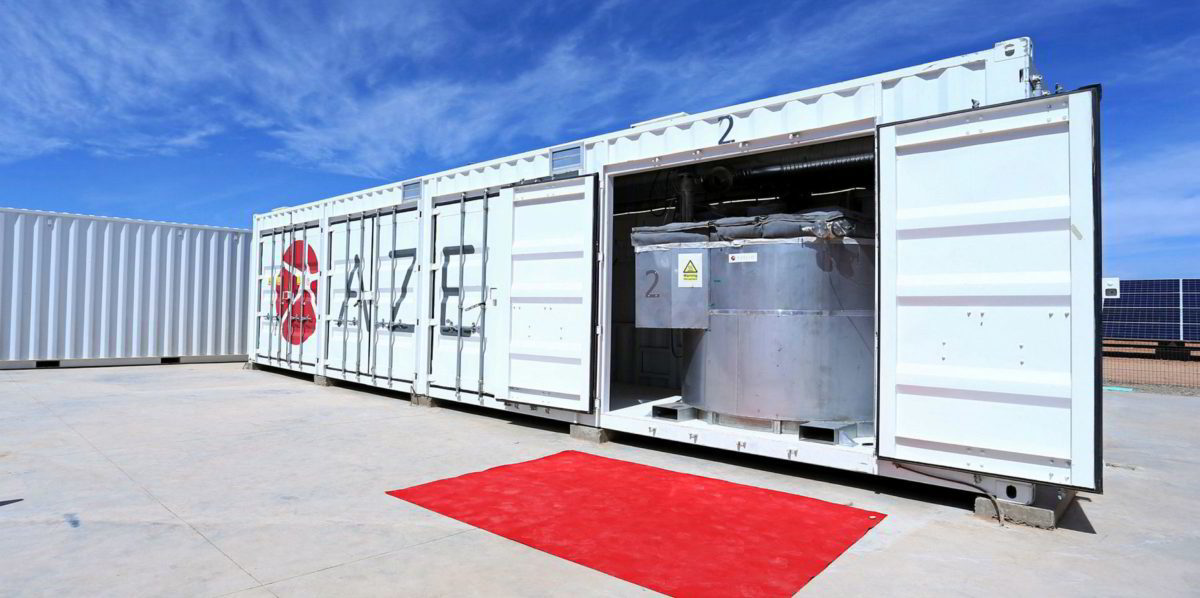Somewhere between cryptic and confusing, Swedish storage startup Azelio has announced a vague deal with a New South Wales property developer.
Azelio is seeking to commercialise energy storage in molten aluminium. Its TES.POD product seems to work in four steps – first it is charged by a renewable source of electricity, which is then stored in the form of heat in a recycled aluminium alloy, with a phase change at 600 C. The heat is in turn dispatched to a Stirling engine, which is a closed-cycle regenerative heat engine with a permanent gaseous working fluid. The engine generates usable heat with a temperature ranging from 55 C to 65 C and electricity that can be utilised on demand at all hours of the day.
The company says five of these devices have been ordered by MPG Built, a subsidiary of Molnar Property Group. With little information available, what can be said of this company is that it is based in Wollongong, south of Sydney, but its relationship to renewables isn’t at all clear. Molnar is listed as a real estate developer while MPG Built apparently specialises in fencing.
“Based on the conditional order, Azelio AB will, through a SPV (Special Purpose Vehicle), install solar power and its long-duration energy storage system for clean low-cost power. Electricity will be supplied to MPG Built, based on an Energy-as-a-Service (EaaS) model,” Azelio’s release reads.
A SPV is a separate legal entity formed to undertake a specific business purpose or activity – meaning Azelio seems to be planning to form a subsidiary for the purpose of doing business in Australia.
“The SPV will implement, own, and operate the power system and provide energy to MPG Built at terms defined in the agreement,” it says. “MPG Built acting as a merchant [and] will on-sell the power to the grid.”
Azelio goes on to say its agreement with MPG Built covers 20 years and is expected to generate a revenue of up to $615,000 (USD 414,000) in the first year. Where those revenues will come from is also murky as the company includes very little information on its envisioned “Energy-as-a-Service” model.
“The agreement, which is estimated to require investments of EUR 3 – 4 million [$4.6 – 6 million] is subject to Azelio arranging financing for the SPV, which is expected to be facilitated by the solar element of the project,” the company said.
The solar part of the system is expected to be installed and in operation in 2023, according to Azelio. “Delivery of the energy storage system, and start of operation of the complete power system, are expected in 2024.”
Azelio CEO Jonas Wallmander said “Australia has excellent market conditions for our long-duration energy storage solution … This can help pave the way for a broader introduction of our technology in the region, and I am convinced that long-duration energy storage solutions, such as ours, can play a great role in increasing the use of renewable energy in this part of the world.”
This content is protected by copyright and may not be reused. If you want to cooperate with us and would like to reuse some of our content, please contact: editors@pv-magazine.com.









By submitting this form you agree to pv magazine using your data for the purposes of publishing your comment.
Your personal data will only be disclosed or otherwise transmitted to third parties for the purposes of spam filtering or if this is necessary for technical maintenance of the website. Any other transfer to third parties will not take place unless this is justified on the basis of applicable data protection regulations or if pv magazine is legally obliged to do so.
You may revoke this consent at any time with effect for the future, in which case your personal data will be deleted immediately. Otherwise, your data will be deleted if pv magazine has processed your request or the purpose of data storage is fulfilled.
Further information on data privacy can be found in our Data Protection Policy.